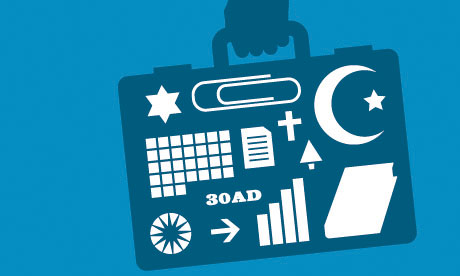
Most of us are painfully aware of, and sad about, how highly structured our time is. Anyone in employment or with children to look after knows just how many appointments litter the diary. The weeks are filled with engagements: finance meetings, tax inspections, deliveries, school plays and so on. When we imagine a better life, it tends to be one in which there are simply far fewer stretches of time devoted to any one thing in particular. The opposite of work is a category, relatively new in history, that we are calling "free time", a period cherished for the very fact that it contains no appointments whatsoever.
What is striking about this arrangement is how much it differs from the vision of time put forward by all the major religions. They have always pictured free time differently. For them, there is nothing inherently wrong with having an appointment. It does not, by itself, spoil time. The key detail is that we should have an appointment with something important – which for them means something related to the needs of our souls. Here, in particular, religions differ from the secular world. Most people today picture an appointment as something they might have in an office with a few people around a table talking about a spreadsheet. It is working life, and the capitalist version of it, that dominates this thinking about appointments. For religious people, however, appointments are occasions when they can reconnect with the divine; something they feel the need to do about as often as others think of watching the news.
Religions have all established elaborate calendars that let no month, day or hour escape without administration of a precisely calibrated dose of ideas. For example, every evening at 10pm devout Roman Catholics must examine their consciences, read a psalm, declare In manus tuas, Domine ("Into your hands, Lord"), sing the Nunc dimittis from the second chapter of the Gospel of Saint Luke and conclude with a hymn to the mother of Jesus. Others have ... the news.
The prestige of the news is founded on the assumption that our lives are forever poised on the verge of some critical transformation thanks to the two driving forces of modern history: politics and technology. We therefore have to catch up on new developments, for fear of being "left behind" and thus unable to function.
For the religious, there is no need to harvest updates incrementally through news bulletins. What they see as the great stable truths can be written down on vellum or carved into stone rather than swilling malleably across handheld screens. For 1.6 billion Buddhists, there has been no news of world-altering significance since 483BC. For their Christian counterparts, the critical events of sacred history came to a close around Easter Sunday in 30AD, while for the Jewish sacred calendar, the line was drawn a little after the destruction of the Second Temple by the Roman general Titus, in 70AD.
Even if we do not concur with the messages that religions schedule for us, we can still concede that it could be useful to structure not only our working lives, but also our emotional and psychological ones. Here, too, we might need a schedule, so we can bump into important concepts on more than just an ad hoc basis. It might be with Tolstoy rather than the Bible, but it should be a ritual nevertheless. Our appointments should not merely be related to money; our time should also include regular meetings with those ideas that sustain our souls.
• Alain de Botton is a founder of The School of Life and author of best-selling books including Religion for Atheists (Hamish Hamilton). alaindebotton.com. To order Religion for Atheists by Alain de Botton for £12.99 (RRP £18.99), visit theguardian.com/bookshop or call 0330 333 6846.

